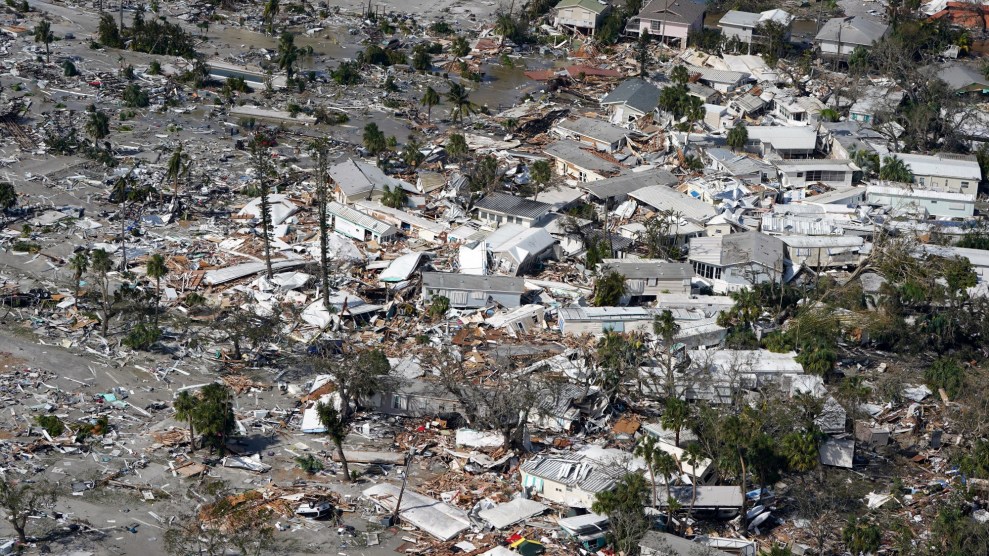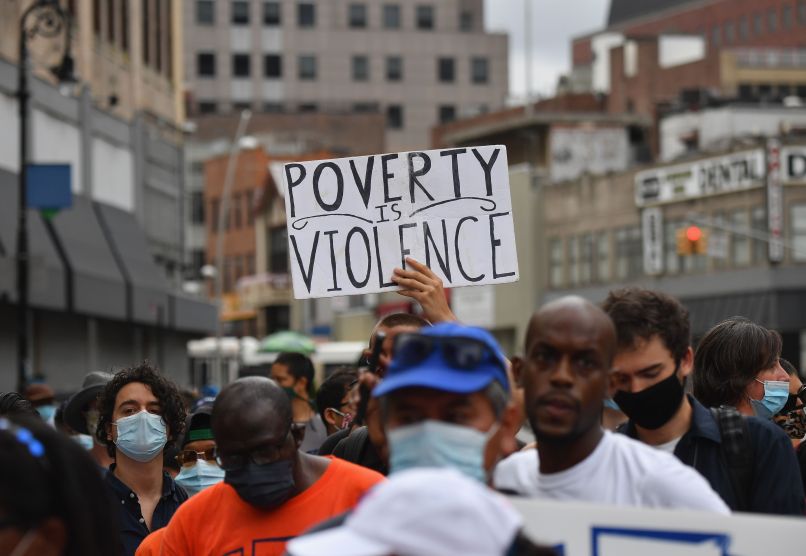
Getty
This story was originally published by Grist and is reproduced here as part of the Climate Desk collaboration.
American homes in flood zones are overvalued by hundreds of billions of dollars, according to a study published on Thursday in the journal Nature Climate Change. Low-income homeowners in states controlled by Republicans are especially at risk of seeing their home values deflate as global warming accelerates.
Flooding is a costly and deadly natural hazard across the United States. For decades, the Federal Emergency Management Agency offered flood insurance at discounted rates, incentivizing developers to build houses in flood-prone areas. The agency’s flood maps are also notoriously outdated. That has led to a dangerous situation for homeowners as they grapple with year after year of debilitating floods.
The study, published by a group of academic, nonprofit, and government organizations that include the Environmental Defense Fund and the Federal Reserve, revealed that homes in flood zones are overvalued by as much as $237 billion.
The researchers found that coastal property owners and homeowners in states that have inadequate or nonexistent flood disclosure laws, such as Florida, where there are no disclosure laws and homes are overvalued by $50 billion, were particularly vulnerable to overvaluation. They also found that a large share of overvalued homes are in areas that FEMA says aren’t currently at significant risk of flooding, a signal that flood maps need updating.
The study’s authors told Grist that states need to gauge and clearly communicate flood risk to homeowners regardless of whether their home is located in one of the agency’s “special flood hazard areas,” where flood insurance is mandatory for most mortgages.
According to the study, low-income homeowners could see up to 10 percent of their market value disappear in coming years, a blow for those least able to withstand one. “What we find is that lower-income households are more exposed to risk of price deflation in the housing market,” Jesse Gourevitch, a fellow at the Environmental Defense Fund and a co-author of the study, told Grist. “If that bubble were to burst those households could be at risk of losing home equity.”
The fallout from climate-fueled flood risk extends beyond individual homeowners to their larger communities. The study showed that cities in northern New England, eastern Tennessee, central Texas, Wisconsin, Idaho, Montana, and many coastal areas could see their budgets shrink if the true value of homes in flood zones were taken into account and property tax revenues declined as a result.
“Many local governments are heavily dependent on property tax revenue for their overall budget,” Gourevitch said. “In areas with particularly high flood risk and where flood risk isn’t adequately priced into property value, there is this possibility that the assessed value of properties could fall.”
Some states have passed laws that require sellers to disclose flood risk to buyers, which is a good way to hedge against the overvaluation described in the study. This week, the North Carolina Real Estate Commission approved a petition to give homebuyers the right to information about flood risk. But twenty-one states, including Georgia and New York, still keep homebuyers in the dark. Implementing disclosure requirements in those states could help address the future financial risk of flooding.
The study “raises a lot of moral questions for policymakers about who will bear the costs of these climate impacts,” Gourevitch said. State and federal lawmakers may soon have to reckon with whether overvaluation is an individual burden or if it’s on the government to bail people out.















